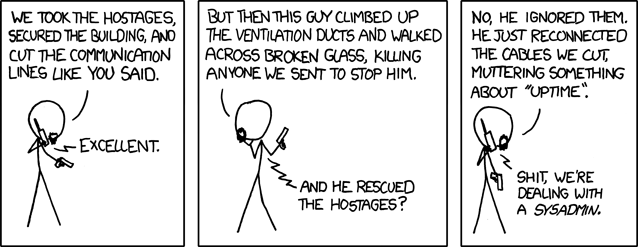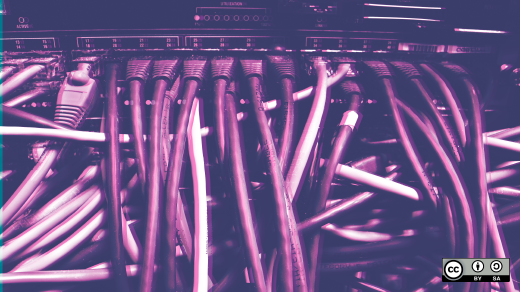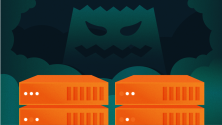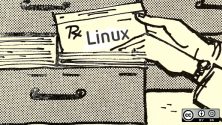You've probably heard many stereotypes about system administrators and the job itself. Like most stereotypes, they have varying levels of accuracy, so it's worth digging a little deeper if you're considering a career change.
Here's the truth about are some of the things you may have heard about network and system administration.

opensource.com
Sysadmins are strangely focused
As this xkcd comic suggests, sysadmins tend to be proud of the work they do and devoted to producing results. These days, that means service availability, rather than high uptime for any given server, but the principle stands. The job itself seems to attract (or possibly create) people who are dedicated to their job metrics. This can be a good thing, but as the comic hints, there are other important things in life that warrant attention, like maintaining your relationships with family, friends, health, and other interests. Most sysadmins do, or they aren't sysadmins for more than a few years.
Sysadmins are on call
Being on call is part of life for most sysadmins, and it's sometimes a point of pride. If you're not willing to be on call, being a sysadmin probably is not for you. Less obvious is that sysadmin culture has steadily shifted away from a hero mentality. A pager (or other alert system) going off is not an opportunity for grand theatrics, rather it calls for a zero-blame, lean, iterative improvement in process or technology. The older truism is that if everything is working, a sysadmin is invisible. That doesn't mean that if something is not working the sysadmin who responds is visible, rather it means that a flaw in the overall system has been exposed that the team can work to improve.
Sysadmins are invisible (the good ones)
It's true that sysadmin jobs typically don't pay as well as software developer jobs for similar training and experience. If making the most money or having the higher profile of shipping customer-facing features are important to you, you might be happier as a software developer. However, despite the fad-like headlines, DevOps and lean methodologies really are consistently improving organizational effectiveness and reducing the classic friction between operations and developers. As Nicole Forsgren of Chef has explained, soon sysadmins won't be seen as progress-blockers but as valuable allies. Working in operations has become a more pleasant job than it used to be, and it is set to improve even more.
Sysadmins and open source go hand in hand
Being a sysadmin allows you to make your living from and contribute in multiple ways to open source software. When proprietary Unix flavors ruled, it wasn't clear this is how it would turn out, but now it's almost a foregone conclusion that you'll work with open source software like Linux, BSD, and even open source Solaris. The field's luminaries are often people who've created a new open source tool or contributed hundreds of patches or support. You may also find your employer relatively relaxed about (or even supporting) spending your work time contributing to sysadmin-relevant open source projects, whereas your software engineer peers may have more of a challenge. Also, you'll likely have the opportunity to make recommendations to your employer about which software to use and when it is worth paying for open source software support.
Sysadmins are cool with constant change
Whether you are just getting started or making a career change, if you stick with system administration, you can expect things to change. Server operating systems moved rapidly from multiple, proprietary Unix flavors to almost entirely Linux. Server hardware quickly evolved from a variety of distinct CPU architectures and exotic interconnects to almost entirely x86_64. Next came the wave of virtualization, followed by containerization to more efficiently use individual server machines too powerful for individual services. And no one can ignore the continuing wave of migration from on-premises hardware to rental hardware in the cloud. All these trends are likely to continue and deepen, even as new trends form. As generalists, sysadmins have been able to transform along with the job, and you'll need to be prepared to do the same.
Sysadmins can write code
Increasingly the sysadmin's focus is on software. As hardware has become thoroughly commoditized, abstracted, and rented, being a sysadmin today has less to do with deep knowledge of hardware and more to do with the layers of software less understood by software engineers, e.g., the operating system, virtualization, containers, networking, and so on. Sysadmins don't spend much time working with hardware anymore, and if that is your primary interest, be prepared to shop around more carefully and compromise on other aspects of the job. While a sysadmin isn't a software engineer, you can't get into the career intending to never write code. At a minimum, being a sysadmin has always involved writing small scripts, but the demand for interacting with cloud-control APIs, testing with continuous integration, etc. means that sysadmins will increasingly be called to write code.
Want to know more?
Check out I Am Sysadmin (And So Can You!), a great talk by Ben Rockwood of Joyent. And look for my next article to incorporate some of these insights into your job search, including tips to evaluate job postings and opportunities.







1 Comment